 My guest today is Jeanne Reames who is a fellow Etruscophile and lover of the ancient world, Macedonia. In short, she’s a mother, writer, Homer fangirl and Alexander the Great geek. Jeanne is also a history professor at the University of Nebraska-Omaha where she teaches Greek, Macedonian, and Ancient Near Eastern classes, and directs their Ancient Mediterranean Studies Program. She has also served as graduate program chair for history. She was born and raised in Florida but escaped its humidity and bugs. She has Miami and Peoria Indian ancestry. In her spare time, she likes to garden, cook, and run herd on her cats; she has three.
My guest today is Jeanne Reames who is a fellow Etruscophile and lover of the ancient world, Macedonia. In short, she’s a mother, writer, Homer fangirl and Alexander the Great geek. Jeanne is also a history professor at the University of Nebraska-Omaha where she teaches Greek, Macedonian, and Ancient Near Eastern classes, and directs their Ancient Mediterranean Studies Program. She has also served as graduate program chair for history. She was born and raised in Florida but escaped its humidity and bugs. She has Miami and Peoria Indian ancestry. In her spare time, she likes to garden, cook, and run herd on her cats; she has three.
If you are fascinated by Alexander the Great then you’ll enjoy Jeanne’s Dancing with the Lion duology which examines Alexander’s story from the Macedonian perspective. You can find buy links to various sites for her books on here. Both books can be bought via her publisher, Riptide, at a discount.
Connect with Jeanne Reames via Tumblr, her blog, and Academia.
What is the inspiration for your current book? Is there a particular theme you wished to explore?
Because I’m a history professor, most folks assume I started there, then decided to write a novel about Alexander the Great. Actually, it went the other way. My BA is in English/creative writing.
I’m a novelist who became a historian, not a historian who became a novelist.
As for themes, I should note that the Dancing with the Lion was divided for publishing, so both halves, Becoming and Rise, need to be read together for the original thematic arc. (Also, the Author’s Note is at the end of book 2, Rise.)
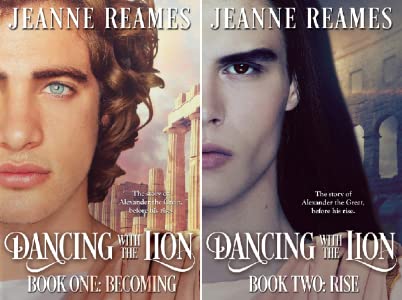
The main protagonists are Alexander before he became “the Great” and his dearest friend Hephaistion. It begins with their meeting and explores their relationships, both with each other and with their fathers, friends, families. Alexander must decide what sort of king he will be: how much like his father, and how different? He imagines himself more ethical than Philip, and the last line of Rise is both absolutely true for him in that moment, and also horribly ironic. As for Alexander and Hephaistion, their friendship/love was legendary in antiquity and for centuries after. Alexander was lucky; it’s rare for such an enormously powerful figure to have someone he trusted so absolutely. When Hephaistion died of some febrile illness in 324 BCE, Alexander gave him the most expensive funeral in history, then followed him to the grave 10 months later.
For the Greeks, philia (love/friendship) was more important than eros (desire). The ancient Greeks had no issues with homoeroticism (a better term for that era than homosexuality), but they had social restrictions—just not the same as ours. It was WHAT one did (active or passive), not who. That’s explored in the novel. Alexander and Hephaistion’s relationship is transgressive, but not because they’re both male. It’s transgressive because Alexander is the younger partner (by not-quite 3 years), yet the social superior as prince. How do they navigate that?
Women also have a role. Greek (and Macedonian) culture was misogynistic, men and women living largely separate lives, especially for the elite class. But Alexander’s sister Kleopatra is a point-of-view character. In the second half, Rise, there’s a subplot in the women’s quarters, and it’s not just Alexander and Hephaistion who come of age. So does Kleopatra. I do hope to continue the series in the future, and Kleopatra will remain an important secondary character.
Nor is Alexander’s mother the snaky bitch-queen from hell that we find so often in Alexander fiction (and film). You still wouldn’t want to mess with her, but I view her more akin to Katherine Hepburn as Eleanor of Aquitaine in The Lion in Winter than whatever hot mess Angelina Jolie was directed to perform in Oliver Stone’s “Alexander”. She’s smart, ambitious, and just as ruthless as her husband and son. Yet the things men did without critique as Realpolitik were condemned for women. Alexander’s relationship with her isn’t any less strained at times than with his father, but I swept out the silly Freudian stuff. I hope readers will respect her, if not necessarily always like her.
On my website, I have a number of goodies that my publisher, Riptide, didn’t permit me to include: a reader guide (month system, glossary, characters, a short note on obscenity), short vlogs of the Macedonian landscape, unpublished outtakes and extra scenes, how to pronounce their names, as well as a playlist just for fun.
What period of history particularly inspires or interests you? Why?
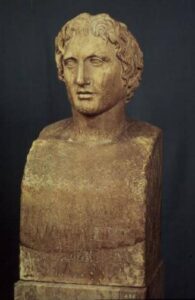
Portrait bust of Alexander the Great (356-323 BC) known as the Azara herm,
Louvre, Paris, France
I backed into Greek history from the north so I’ve always held a Macedonian perspective. The novels reflect that. Most stories about Alexander wind up heavily Greek-influenced as a result of both the ancient sources (which are Greek and/or later Roman), or because most people find out about Alexander as part of reading about/a class on ancient Greece.
I found out about Greece by studying Alexander. Then I brought that perspective to the novels.
While ancient Macedonia was at least quasi-Greek, in antiquity, many Southern Greeks didn’t consider them properly Hellenic. For one thing, they had a monarchy, not a city-state government. They drank their wine “straight” (like we do), which was considered a barbaric practice; Greeks cut their wine with water. Their religion was different too. Instead of building big shiny temples like the Athenian Parthenon, Macedonians built magnificent tombs for the elite classes. They put their money in the private sector rather than the public. Their religion was perceived as “wilder” too, although that’s more bias than actual truth. Those are just a few examples.
The problem understanding ancient Macedonia is that it’s always Greeks or Romans/Romanized Greeks telling us about them. No surviving history of Alexander or his father was written by a Macedonian, or even during their lifetimes by people who knew them. Yes, the histories we still have borrowed from earlier authors, but they’re at least second-hand, and sometimes third- or fourth-. Fishing out the Macedonian perspective takes some work.
In the novels, I wanted to take readers to Alexander’s Macedonia.
What resources do you use to research your book? How long did it take to finish the novel?
Perhaps predictably, I used an enormous amount of academic material. Yet my goal was to internalize that data in order to render a fully-realized world that readers can see, smell, hear…and which customs may sometimes shock. I’ve also been to Greek Macedonia, Greece, and ancient Thrace (modern Bulgaria), as I think it important to tour the land, get a feel. Spring lightning looks different in Macedonia than in Florida where I grew up, or Nebraska, where I live now. No joke. That’s the sort of detail you have to observe. Like noticing the colour of the dirt (sorta orangish from iron oxide).
As for how long…getting it published was more difficult than getting it written. I typed the first line of the story in December of 1988, and had a completed, sellable manuscript by the mid-90s (after I’d decided to embark on a history PhD at Penn State). The snag was always length. As I cut the novel, the accepted word count also shrank, and there’s only so much one can cut. What agents would look at in 1996 was 30-40K longer than in 2006, never mind 2016. I’d thought I might have luck in the wake of Oliver Stone’s “Alexander” in 2004, but the film was such a dud, it killed interest for some years after.
I finally had an offer from Riptide around 2014—if I would divide it in half, which I agreed to do. (The word count of both novels, no back matter, is c. 180K.) For a variety of reasons (not having to do with me), negotiations took a long time: contract not signed till 2017, and the first of the two came out in mid-2019.
So it was quite the odyssey. 30 years to write, revise, and sell a book! With a PhD acquired along the way.
What or who inspired you to first write? Which authors have influenced you?
I’ve been writing stories since 6th grade, and really, telling stories since I was four. My parents said I’d call them into my bedroom, then put on little plays for them.
As for inspiration, I joke that I want to be Toni Morrison when I grow up. There are a number of other authors who have inspired me from David James Duncan to Iris Murdoch to Leslie Marmon Silko to Flannery O’Connor. All write stories quite different from mine, in both genre and style, but I still consider them to be teachers.
How do you reconcile writing historical fiction with being a professional historian?
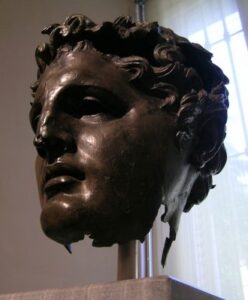
Prado Bronze, Madrid – Hephaistion?
In the author’s note at the end of book 2, I say, “Historical fiction is not about who any given historical figure actually was, but with who we are now, and what it’s possible for us to become.” I also like Guy Vanderhaeghe’s comment: “History tells us what people do; historical fiction helps us imagine how they felt” (“A Good Guy,” Quill and Quire, Sept. 2011). These sum up my approach to writing historical fiction vs. academic history.
I tell people that writing fiction makes me a better historian, which may raise eyebrows, but fiction makes me ask questions my colleagues might not consider. For instance, King Philip was assassinated in a theatre full of thousands of spectators; Hollywood couldn’t have staged it better. Yet academic papers on his death ask who instigated the murder. As an author, I also have to wonder how they got everybody out of there without it turning into a madhouse! Or maybe it was a madhouse.
Also, fiction forces me to think harder about the “layers” of history. First, we have data and details (not all of which can be trusted), then we have varying degrees of supposition: what is probably true, what may be true, and what could be true: each a step further along the path of “educated guesses.” I’m less inclined to blur those lines because I get to do that in my stories. Yet historical fiction uses the past to talk about the present, so I’m always conscious that my characters are not the same as the historical figures, even if the historical figures provide a base on which to build. For a longer discourse on my views on being an historian writing historical fiction, you can read my essay on Tumblr What is “Historical” Fiction Anyway?
Do you use a program like Scrivener to create your novel? Do you ever write in long hand?
I only write notes to myself in longhand these days. I can still remember discovering word processors in my first year of college at Univ. of Florida. What a revelation! Painless editing! Ha. I’ve never used anything beyond a simple word processor, however.
Is there a particular photo or piece of art that strikes a chord with you? Why?
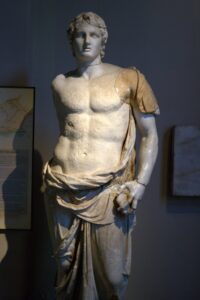
Alexander – Istanbul Museum
We have oodles of Alexander statues. He, Augustus, and Antinoos (Emperor Hadrian’s boyfriend) are probably the most frequently depicted non-religious figures in Greco-Roman art. The “face” cover of the first novel is based on the Acropolis Head of Alexander at about 18. It’s a pretty good match, almost uncanny, although idealized. (Alexander wasn’t that pretty.)
The image most likely to be an accurate likeness is the Azara Herm, found today in the Louvre. Even so, my personal favourite Alexander sculpture is a full-body version in the Istanbul Museum. For Hephaistion, I tend to think of the Prado Bronze. Although mostly identified as Demetrios Poliorcetes these days, that is an attribution; the statue isn’t labelled. Hephaistion has also been proposed as a possibility. I like it.
Neither the Azara Herm nor the Prado Bronze were used for the “statue” versions of the book covers, due to museum copyright costs. The novels have two cover versions: the “face” covers, and the “statue” covers. The interiors are exactly the same; only the exterior is different, so if you order a print-on-demand copy instead of the ebook, you can choose your cover.
What advice would you give an aspiring author?
If I got a book published after 30 years…keep trying. There were many times in that 30-year period that I shoved the novel, convinced I sucked as a writer and should just quit. But periodically, I’d pull it out and try again. Finally, I found a publisher willing to take a chance on it. Sure, I had a “platform” as an academic, but that sort of platform can work against one with editors (and readers). Can an academic spin a good yarn? Most readers have no idea I began as a writer, not an academic.
Tell us about your next book.
I would like to continue Alexander’s story but Riptide was willing to buy the first only because it could be marketed as a romance, even if it’s a coming-of-age story. They don’t want the rest, which is manifestly not a romance. I’ll need a new publisher for that.
In the meantime, my current project is a 4-book epic fantasy series called Master of Battles. Like a lot of fantasy, it steals from history as analogue, but is set on an alien world with a different geography…all part of the fun. Thematically, I explore questions of what “civilized” means, and upend popular narratives of conquest as heroic. I also explore issues of gender.
The elevator pitch is, “A fugitive shaman fleeing his wicked teacher falls over a balcony into the bedroom of a quirky prince, setting off a prophecy that will change their world.” But for me, the cool part is re-imagining how cultures might have developed if the geography were radically different. So I threw all the puzzle pieces up in the air to see where they landed. In terms of technological development, it’s roughly the 4th century CE (think Emperor Constantine). But there are no Himalayas, and Rome never rose. Ergo the monster empire is in the east (a mishmash of China-India-Persia). There’s a rainforest where North Africa/the Sahara is (think Brazil), and the Middle Sea is much larger, divided into two basins by an archipelago. The bulk of continental masses are south, not north, and there are two moons. There are also two human sub-species who survived: the Ensāni and the Aphê, the latter of which has a prehensile tail (because who has never wanted an extra hand?). It’s loads of fun to do these re-imaginings.
I’m about 3/4s of the way through book 3, but won’t try to sell it until I have a draft of book 4. If not historical fiction, or even historical fantasy, fans of history should still enjoy how I retooled historical details. Easter Eggs abound. For instance, book one starts in Felathri of Felsina, and Ision is prince of Emathia. Google those place-names. 😉
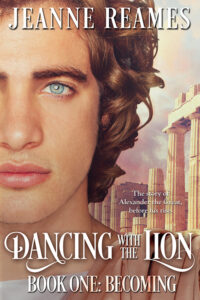
Two boys, one heroic bond, and the molding of Greece’s greatest son.
Before he became Alexander the Great, he was Alexandros, son of Philip, the celebrated King of Makedon. But rather than a life of luxury, as prince he must excel his peers in all ways: be faster, smarter, stronger, and more courageous, tackling problems without any help. Competition and status define one’s fate in his world, loyalty rare and precious. Alexandros finds that loyalty in Hephaistion, one of the boys assigned to accompany him for lessons under Aristoteles. With Hephaistion’s fidelity and friendship, he learns to trust his skills and become a leader of men.
Thanks so much Jeanne. You story has many echoes in my own publishing journey. And I know the Etruscans are also in your expert bailiwick. I look forward to learning more about the ancient Macedonians.
Both books can be bought via her publisher, Riptide, at a discount. You can find buy links to various sites for Jeanne Reames books on here.
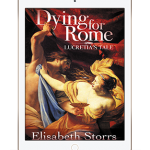 Haven’t subscribed yet to enter into giveaways from my guests? You’re not too late for the chance to win this month’s book if you subscribe to my Inspiration newsletter for giveaways and insights into history – both trivia and the serious stuff! In appreciation for subscribing, I’m offering an 80 page free short story Dying for Rome -Lucretia’s Tale.
Haven’t subscribed yet to enter into giveaways from my guests? You’re not too late for the chance to win this month’s book if you subscribe to my Inspiration newsletter for giveaways and insights into history – both trivia and the serious stuff! In appreciation for subscribing, I’m offering an 80 page free short story Dying for Rome -Lucretia’s Tale.



These sound amazing and I hope that Jeanne continues with the series! Will definitely give the duology a look. Appreciate the historical info as well!
Thank you! I hope I can find a home for the rest of the series, as well. :-)
I too am a fan of books in this genre including those about ancient Rome. The idea of moving a historical setting into a sci-fi environment also sounds intriguing. I will check out the blurbs on this duology as it sounds fascinating. Kudos to you for introducing me to another gifted author!
Thank you!
The fantasy series isn’t, technically, an historical, or even historical fantasy, but it steals a lot. Ha. More in terms of cultures than people or events. I was really curious about bringing in the equivalent of the Americas much, much earlier, and removing the barrier of the Himalayas would allow China to move west more easily.
This was an amazing interview and I definitely want to read Dancing With The Lion. It’s obvious that Jeanne has done extensive research and it all sounds so fascinating. Oh my goodness I would get so wrapped up in the research I never have time to write. This was an absolutely wonderful, interesting and captivating interview. I’m so glad I clicked the link. Thank you so much Jeanne.
Thank you! I hope you enjoy it!
I don’t know much about Alexander. I saw the movie with Colin and Angelina Jolie, very interesting.
The movie had a number of anachronistic problems, as you can imagine. Olympias is very different in the books. Ha.
I grew up with Mary Renault’s trilogy on Alexander, so it will be interesting to compare her take on the early Macedonian years with Jeanne’s.
And how fascinating for Jeanne to have come to academia via her writing, not the other way around!
Thank you! And yes, historical novelists (the good ones) do a lot of research, I just seem not to have figured out where to stop! LOL.
The novels are fairly different, I think, except where we are relating historical events from his youth. I had the advantage of a lot of recent archaeological breakthroughs. I started in a different place, although her Fire from Heaven and mine stop in about the same place: one doesn’t ignore such a major historical gift-horse. LOL